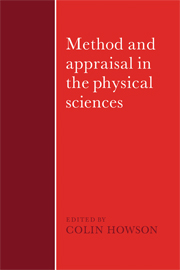Book contents
- Frontmatter
- Contents
- Editorial preface
- History of science and its rational reconstructions
- Atomism versus thermodynamics
- Thomas Young and the ‘refutation’ of Newtonian optics: a case-study in the interaction of philosophy of science and history of science
- Why did oxygen supplant phlogiston? Research programmes in the Chemical Revolution
- Why did Einstein's Programme supersede Lorentz's?
- The rejection of Avogadro's hypotheses
- On the critique of scientific reason
- Index of Names
The rejection of Avogadro's hypotheses
Published online by Cambridge University Press: 04 August 2010
- Frontmatter
- Contents
- Editorial preface
- History of science and its rational reconstructions
- Atomism versus thermodynamics
- Thomas Young and the ‘refutation’ of Newtonian optics: a case-study in the interaction of philosophy of science and history of science
- Why did oxygen supplant phlogiston? Research programmes in the Chemical Revolution
- Why did Einstein's Programme supersede Lorentz's?
- The rejection of Avogadro's hypotheses
- On the critique of scientific reason
- Index of Names
Summary
Introduction
Many historians tell us that the development of the atomic theory in the early nineteenth century was due primarily to three men: Dalton, Gay-Lussac, and Avogadro. They state that Dalton revived the atomic theory at the beginning of the nineteenth century, and that in 1808 Gay-Lussac proposed the experimental law that reacting gases combine in such a way that the constituents and the resultant, if gaseous, are all in simple proportions by volume to each other. They then point out that it was common knowledge that this law is a simple consequence of the atomic theory and the hypothesis, which I shall call the equal numbers thesis, that equal volumes of all gases, at a given temperature and pressure, contain the same number of particles. But, they observe, the equal numbers thesis seemed to be refuted by at least two independent sets of experimental results. And they conclude their story by arguing that in 1811 Avogadro exposed these refutations as being merely apparent by showing that they depended upon the false assumption that all gaseous elements consist of single atoms.
This tale is common. It poses two well-known and much discussed historical problems. The first one is: why did Dalton explicitly reject Gay-Lussac's law, despite the fact that it seemed to support his atomic theory? And the second problem is: why did nearly all working chemists ignore Avogadro's hypotheses for fifty years?
Information
- Type
- Chapter
- Information
- Method and Appraisal in the Physical SciencesThe Critical Background to Modern Science, 1800–1905, pp. 277 - 308Publisher: Cambridge University PressPrint publication year: 1976
Accessibility standard: Unknown
Why this information is here
This section outlines the accessibility features of this content - including support for screen readers, full keyboard navigation and high-contrast display options. This may not be relevant for you.Accessibility Information
- 10
- Cited by
